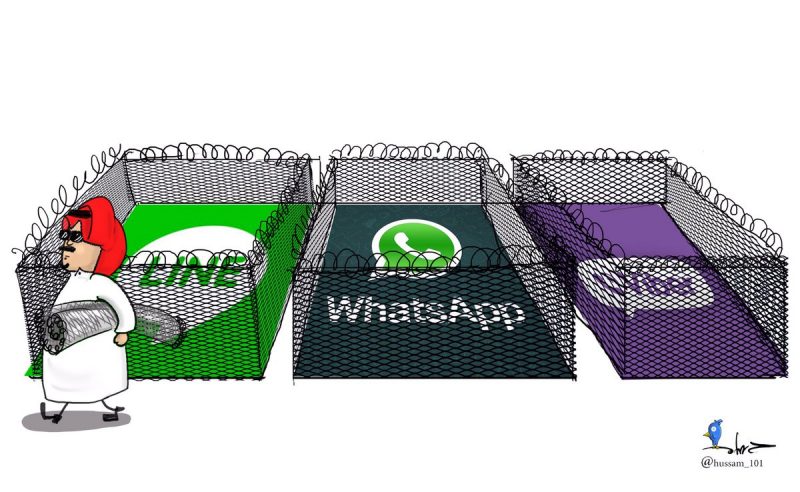
Saudi Arabia already blocks several other massaging and calling apps including Whatsapp and Viber. Cartoon by Hussam Al-Zahrani
Residents of Saudi Arabia can no longer make calls using the messaging and voice calling app LINE. Authorities blocked LINE's calling feature over the weekend of September 3, adding it to the long list of VoIP services and messaging apps entirely or partially blocked in Saudi Arabia.
The blocking of LINE angered Saudi users who took to Twitter to protest the conservative kingdom's Internet censorship policies. The sudden absence of LINE's calling features, alongside blocked services like Skype and Facetime, prompted user Abdelaziz Abdallah to ask:
#هيئة_الاتصالات_كفاية_حجب
زودن على ضعف الانترنت واسعار المكالمات جميع البرامج محجوبه
^ وش الفايده من تفعيل الانترنت؟ pic.twitter.com/MeU2S3aoG1— عبدالعزيز بن عبدالله (@a_aA15) September 5, 2016
in addition to the slow internet, and the price of calls, all applications are blocked. What's the point of having the internet?
Apps blocked in the country include Viber, WhatsApp, Facebook Messenger, Telegram and Skype as seen in the graphic below, which was posted by user Mohammed Alarfaj on Twitter:

Apps blocked in Saudi Arabia. Viber and Facetime are blocked entirely, while Snapchat, Telegram, and Skype are partially blocked. Only calls are blocked on Whatsapp, Line, Google Hangouts and Facebook Messenger. Source: @iM7M7 on Twitter
The graphic explains that these applications and services were either blocked by the Communications and Information Technology Commission (CITC), the telecom industry regulator in Saudi Arabia, or the telecom service providers operating in the country, without any official announcement. On its website and different social media platforms, the CITC has so far not posted any statement or announcement related to the blocking of LINE, which is operated as a subsidiary of South Korean tech giant Naver.
Using the Arabic language hashtags “enough blocking, telecommunication commission” (#هيئة_الاتصالات_كفاية_حجب), “blocking of line calls” (#حجب_مكالمات_اللاين), and “we demand the improvement of the Internet [service] in Saudi [Arabia]” ( #نطالب_بتحسين_النت_في_السعوديه), Saudis slammed the telecommunication industry regulator, the government, and operators for not prioritizing customers’ rights and consumer interests.
#نطالب_بتحسين_النت_في_السعوديه
الاشياء الي جالسة تسويها شركات الاتصال هو تنمر على الشعب بسبب انها الشركات الوحيده بالسعودية والشعب يحتاجها— سلطان (@IsulzzxX) September 6, 2016
what the telecom companies are doing is a bullying of the people, since they are the only companies in Saudi Arabia and the people need them
طريقة رخيصة لزيادة دخل شركات الإتصالات في المملكة !
الحل بعد بضعه أيام ببرامج أخرى منافسة للاين.
— Motaz معتز السليم (@motazAlsolaim) September 4, 2016
Blocking Line calls is a cheap strategy to increase the profits of the telecom companies in the kingdom. In a few days, there will be a solution with other packages competing with Line
Addressing the CITC, the telecom industry regulator in Saudi Arabia, user Badr Al-Atibi tweeted:
تراعون فقط مصالح شركات الاتصالات والمواطن اخر همكم ،.اغلب الناس يكلم اقاربهم وابناءهم المغتربين عبر هذه التطبيقات #هييه_الاتصالات_كفايه_حجب
— بدر العتيبي (@bbdsbbd) September 5, 2016
you only care about the interests of telecommunication companies, the citizen is your last concern. Most people talk to their expat relatives and children using these applications
Abeer AlMutairi expressed concern that Saudis will eventually be left with one texting option, SMSing:
اتوقع اخرتها بيحجبون مايبقى الا الرسايل النصية:)، مايصير كذا حجب بدون أي أسباب مقنعة العالم تتطور وحنا نرجع للورا. #هيئة_الاتصالات_كفاية_حجب
— Abeer AlMutairi. (@iAbeerAlMutairi) September 5, 2016
Due to blocking, I expect in the end only SMS will remain. Blocking should not take place without any convincing reasons. The world is progressing, and we are going backwards.
Tasked with regulating the communications and information technology sector with the aim of achieving “a highly competitive environment for the provision of superior services to end-users and an attractive ecosystem for investors”, the CITC is responsible for censoring thousands of websites, and sending content removal requests to social media platforms.
Saudi Arabia is not the only country in the Arab region to block VoIP services. In the United Arab Emirates, providing such services remains the prerogative of the country's only two operators and service providers, Etisalat and Du. The UAE government owns a majority of shares of both companies. Earlier this year, Morocco, which has for so long been praised for liberalizing its telecommunications sector, banned VoIP services over mobile and wifi networks, under the pretext that Article 2 of the telecom law (law n°24-96) only allows for licensed operators to provide phone call services.




15 comments